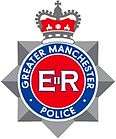Greater Manchester Police
| Greater Manchester Police | |
|---|---|
| Abbreviation | GMP |
|
Badge of the Greater Manchester Police | |
| Agency overview | |
| Formed | 1 April, 1974 |
| Preceding agency | Manchester and Salford Police |
| Employees | 11,045[1] |
| Volunteers | 350[2] |
| Annual budget | £524.1 million[2] |
| Legal personality | Non government: Police force |
| Jurisdictional structure | |
| Operations jurisdiction* | Police area of Greater Manchester in the country of England, UK |
.svg.png) | |
| Map of Greater Manchester Police area | |
| Size | 492 square miles (1,300 km2) |
| Population | Approx. 2.7 million |
| Legal jurisdiction | England & Wales |
| Constituting instrument | Police Act 1996 |
| General nature | |
| Operational structure | |
| Headquarters | Central Park, Northampton Road, Manchester |
| Constables | 7,202 (of which 702 are special constables)[3] |
| Police Community Support Officers | 773[2] |
| Police and Crime Commissioner responsible | Greater Manchester Police and Crime Commissioner |
| Agency executives | |
| Child agency |
Tactical Vehicle Crime Unit Manchester Ship Canal Police (1893–1993) Manchester Airport Police (1954–1976) |
| Divisions | 12 |
| Stations | 62 |
| Facilities | |
| Airbases | City Airport Manchester |
| Panda cars |
Ford Focus Vauxhall Astra Hyundai i30 |
| Pursuit vehicles |
Vauxhall Vectra C Volvo S60 BMW 3 Series BMW 5 Series |
| Patrol vehicles |
Range Rover Volvo V70 BMW X5 Land Rover Discovery |
| Helicopters |
India 99 MD Explorer (1) |
| Planes |
(De-commissioned)India 66 Britten-Norman Defender (1) |
| Website | |
| www.gmp.police.uk | |
| Footnotes | |
| * Police area agency: Prescribed geographic area in the country, over which the agency has usual operational jurisdiction. | |
Greater Manchester Police (GMP) is the Police Force responsible for law enforcement within the metropolitan county of Greater Manchester in North West England. GMP is the fourth largest police service in the United Kingdom after the Metropolitan Police Service, Police Scotland and West Midlands Police; and is also the third largest of the English police forces.
In total, Greater Manchester Police employs; 6,500 police officers, 519 Volunteer Special Constables, 739 Police Community Support Officers, and 2,741 members of police staff. The GMP headquarters are at Central Park, on Northampton Road, in the Newton Heath area of Manchester.
History
_2.jpg)
Greater Manchester Police had its early origins in the Metropolitan Manchester City Police which formed sometime in the 1830s, just after the Metropolitan Police Force in London. The service then changed its name to Manchester Borough Police. Upon Manchester gaining city status in 1853, the police service then changed its name again to Manchester City Police to reflect this status. The name of Manchester City Police remained for over a century until 1968 when Salford City Police was merged in Manchester City Police, resulting in the new name of Manchester and Salford Police. Then in 1974, in accordance with the Local Government Act 1972, Greater Manchester Police was formed with parts of the Cheshire Constabulary and Lancashire Constabulary merged into GMP.
The service was formed in 1974 by the amalgamation of Manchester and Salford Police with parts of Lancashire Constabulary, Cheshire Constabulary and West Yorkshire Constabulary. The first Chief Constable of the service was William James Richards, followed shortly afterwards, in 1975 by James Anderton. James Anderton was an controversial figure during his 15 years in office due to his outspoken style of leadership and hardline views on crime, policing and morality. In 1991 David Wilmot succeeded James Anderton. In 2002 Michael Todd was appointed to Chief Constable until his death, by suicide, in 2008. GMP's Assistant Chief Constable became the Acting Chief Constable until the appointment of Peter Fahy from neighbouring Cheshire Constabulary.
Police Constable Ian Rodgers was the first GMP officer to be killed in the line of duty in 1975. His death occurred in a railway incident at Stockport. Since the formation of GMP 20 officers have been killed or died in the line of duty.[4] GMP then assisted with the reconstruction of Manchester following the 1996 Manchester bombing, with Garry Shewan.
There was much press coverage of the death of the then Chief Constable Michael J. Todd in March 2008.[5] Todd was seen as a man of action and got more "bobbies on the beat", with himself often doing so.[6] Following Michael J. Todd's death in post, Peter Fahy, previously head of Cheshire Police, was appointed as Chief Constable in September 2008.[7]
In the 1990s, Manchester had gained the deriding tag of 'Gunchester', in reference to the city's high gun crime rate at the time.[8] Greater Manchester Police faced the problem of gun crime in Manchester, particularly in the deprived districts in south Manchester. Key gang leaders were jailed for life in 2009[9] and by 2011, the city had shaken off the tag.[10]
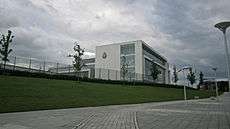
On 14 October 2010, Greater Manchester Police posted details of all calls made to them in a 24-hour period on Twitter.[11][12] The service posted details of every incident reported to its officers in 24 hours to demonstrate how much of their time is spent on what the Chief Constable called "social work" instead of fighting crime.[13] They repeated this exercise on 14 October 2014.[14]
GMP have used social media as a helpful force rather than a hindrance. In the 2011 England riots, with criticism of the role social media such as Twitter and Facebook had in instigating the riots,[15] GMP stated that support on social media had resulted in many responses from members of the public in trying to catch suspects.[16] GMP then naming and shamed any convicted individuals over the riots[17] and the GMP Twitter feed currently has over 100,000 followers, more than any other police service in the UK.
Governance
Since 15 November 2012 the Greater Manchester Police and Crime Commissioner is Tony Lloyd. The police and crime commissioner is scrutinised by the Greater Manchester Police and Crime Panel, made up of elected councillors from the local authorities in the police area. Before November 2012 the Greater Manchester Police Authority was the police governance. However under new plans for an elected Mayor of Greater Manchester announced by George Osborne in November 2014, the position of Police and Crime Commissioner would be removed and its responsibilities subsumed into the mayoral office.[18] The first Mayoral election is expected in 2017.
Organisation
The area GMP polices is split into geographical divisions, with each Metropolitan borough of Greater Manchester being assigned one, with the exception of the City of Manchester, which has two divisions. Each division provides officers that patrol the community, and response officers that respond to emergencies, along with CID officers. Each division is headed by a Superintendent.
Divisions
(In 2012, B and C divisions merged to become the South Manchester division)
- Manchester city centre policing
GMP maintains a neighbourhood policing structure, responsible for policing different areas within the Manchester city centre in Manchester, consisting of:
- City 1 – Canal Street
- City 2 – Castlefield
- City 3 – Chinatown
- City 4 – Piccadilly Gardens & Northern Quarter
- City 5 – Southern Gateway (Covering parts of Oxford Road and the Student Village)
- City 6 – Business & Commercial District
GMP Units
Road Policing Unit
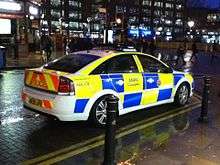
GMP also operates a Road Policing Unit (RPU) responsible for all traffic policing in the county, which includes over 280 miles (450 km) of motorway. GMP RPU uses a variety of vehicles, each with its own purpose. For general roads policing duties the service operates a number of BMW 3 Series Saloon and Estate vehicles which have replaced the previous use of the Vauxhall Vectra Saloon vehicles. The motorway unit operates both BMW X5 and Land Rover Discovery 4x4 vehicles. As well as liveried vehicles GMP also operates a number of unmarked BMW and Audi vehicles, which are used for general road policing and motorway duties. Previously the Motorway and the Motorcycle units stood separately, but in recent years both have been incorporated into the RPU's. BMW R1200RT-P motorcycles have recently replaced the Honda Pan-European ST 1100s & ill-fated ST 1300s. In 2009 The RPU's were divided into three strategic units, based at RPU 1 Leigh, RPU 2 Hyde & RPU 3 Chadderton. Due to the constraints on budgets and the latested review, the Road Policing Unit will lose a further 78 officers and in 2012 restructured/reduced to two RPU's based at Eccles and Chadderton. This has reduce the strength of the RPU to only 100 officers over a 5 shift system providing only 20 officers per shift to cover the police area. 2014 has seen this further reduced to 10-12 officers working the force area per shift as further cuts reduce officer numbers.
During the 1990s, the GMP's area had a high rate of car crime. To combat this the Tactical Vehicle Crime Unit was formed which in 2010 was replaced by Vortex which is based at Stretford Police Station.
In June 2011, The Tactical Vehicle Crime Unit was re formed under the slightly different name, Tactical Vehicle Intercept Unit. The unit continues to use various high performance unmarked vehicles and officers work alongside the ANPR Intercept Unit who use a fleet of 12 liveried BMW 330's to combat serious and organised criminals using the road network.
Air Support Unit
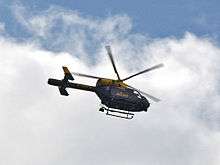

GMP's Air Support Unit, with its call sign as India 99, operates an MD Explorer helicopter, along with a fixed-wing Britten-Norman BN-2T-4S Defender, with its call sign being India 66 (now NPAS **, India callsigns no longer used). The current aircraft operate from City Airport Manchester, formerly Barton Aerodrome. GMP trialled a tethered blimp in 2010 for which would provide surveillance for major events which would be a cheaper alternative to the use of a helicopter in the long term. However, the blimp was only used on 18 occasions and was sold due to operational problems.[19]
From 2012, the GMP Air Support Unit will be part of the National Police Air Service.[20] India 99 will subsequently be part of the North West Air Operations Group division, which will operated four helicopters merged from GMP, Cheshire Constabulary, North Wales Police and Lancashire Constabulary. The service will aim to save money and provide flexibility, as historically each police service was only permitted operate its helicopter in its policing region.[21] The National Police Air Service will operate the four helicopters based on the most serious incidents in the North West Air Operations Group jurisdiction, rather than assigning one helicopter to one region.[21] This creates the possibility that two helicopters could be used in one police area (i.e. Greater Manchester, Merseyside etc.) if incidents are deemed fit and viable to do so.[21]
India 99
The current helicopter has been in operation since 2008, and previous to that, the previous GMP helicopter had served for 7 years.[22] The current aircraft is a McDonnell Douglas 902 Explorer.[22] In 2007, the GMP helicopter carried out nearly 5,500 assignments and was involved in the arrests of 700 suspects.[22]
The forces air support is now covered by NPAS (National police Air service)
India 66
(Now decommissioned) India 66 is a fixed-wing aircraft, mostly used in reconnaissance assignments for GMP. With the Police Service of Northern Ireland & Hampshire Constabulary it is one of only three police services in the United Kingdom to operate a fixed wing aircraft. The current aircraft is a Britten-Norman Islander
Tactical Aid Unit
GMP operates a Tactical Aid Unit which is used in crowd control instances. The service has policed notable riots such as the 2001 Oldham race riots, the 2008 UEFA Cup Final riots and the 2011 England riots which affected Salford and Manchester city centre in 2011.
Serious Crime Division
The SCD is a unit of GMP responsible for dealing with serious crimes and providing protection for vulnerable people.[23]
Counter-terrorism
The GMP Counter Terrorism Unit was formed in April 2007 to prevent the spread of terrorism.[24] The city has experienced incidents with the intention to spread terror, such as the 1996 Manchester Bombing. Most recently, the unit helped thwart the 2009 plot to launch a terror attacks on the Trafford Centre, Arndale Centre and nearby St Ann's Square.[25]
Tactical Firearms Unit
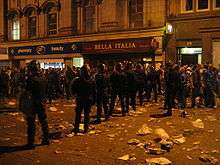
Officers of the GMP, as in the rest of Great Britain, do not routinely carry firearms. Instead, the GMP maintains a firearms unit to provide them with a capability to deal with armed criminals. The Greater Manchester Police, Tactical Firearms Unit maintains Armed Response Vehicles, which transport armed officers to the scene. Like some other services, firearms officers carry the Heckler & Koch G36 along with the Heckler & Koch MP5 semi-automatic carbine, Glock 17 pistol, and the X26 Taser.
Dog Unit
In 2003 GMP had over 110 dogs. However, this has recently been reduced to only 35 dogs across the force, leaving many areas without a single dog available. The dogs are involved in important operational duties such as tracking, building searches, and other criminal work across Greater Manchester. The majority of general purpose police dogs are German Shepherds, but other breeds are also used, including Rottweilers, Belgian Shepherds and Giant Schnauzers.
Mounted Unit
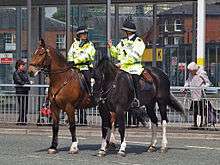
The GMP maintains a mounted policing capability. The mounted officers are employed to target crime hotspots and are also seen at many events including demonstrations and the region's football matches. Horses are also used to search inaccessible areas for missing or wanted people. The unit is made up of a team of specialist police officers, skilled grooms and trainers, and 35 horses. The mounted unit is based at Hough End, in Chorlton, and uses horseboxes to transport the horses for duties around Greater Manchester.
Special Constabulary
GMP has over 650 Special Constables, who are assigned to each of the twelve divisions. Special Constables work alongside their regular counterparts and are mainly assigned to divisions and work within Neighbourhood Policing Teams (NPTs), however some divisions still allow officers to work within response teams when NPT's are not on duty. Between 2009 and 2012 a small number of Special Constables were integrated into the Special Operations Department (X – Depart) working within the Road Policing Units (RPU's), undertaking a full and complete duties within the traffic department, resulting in a high number of arrests, for a variety of offences, and seizure of unlicensed/uninsured vehicles. The dedication of these officers, in both commitment and time, has resulted in a number of awards both within the force and nationally.
In addition there are a number of Special Constables engaged, with support of their employers in "Bus Watch", Hospital Watch" & "Shop Watch". This is where their employer allow the officers paid time, usually 8 hours per month to undertake their Special Constabulary duties at their normal place of work.
Special Constables are normally co-ordinated by the Chief Officer of the Special Constabulary, currently Michael Warmley, and divisional commanders. Under the guidance of the Chief Constable, it was envisaged that the number of Special Constables within GMP would increase to 1,000 officers, within a 3-year period from 2009, todate this target has not been achieved
Video Intelligence Unit
This unit conducts overt surveillance of certain released prisoners and upload some footage onto YouTube of people that they believe have reoffended.[26][27]
Major Investigation Team
Greater Manchester Police has eight specialist Major Investigation syndicates.[28]
Collaborations
Greater Manchester Police is a partner in the following collaborations:
Equipment
Uniform and equipment
The normal GMP uniform is now combat-style trousers and a black zipped-neck polo shirt; a high-visibility jacket is worn as necessary. Headgear for male constables and sergeants is a custodian helmet when on foot patrol. The peaked cap has been withdrawn for these ranks with exception to Tactical Aid Unit and Road policing Unit (white-topped peak caps) and ranks of inspector and above. Female officers wear a rounded bowler-style hat. As with other services, GMP traffic officers wear a cap with a white top. Some specialists, such as police dog handlers and firearms officers, wear a blue shirt.
With effect from 1 June 2009, GMP will be adopting a new uniform for operational officers. This will comprise a back zip-neck shirt and straight-leg-style combat trousers. PCSOs will be issued with a light-blue shirt.
Uniformed officers when on duty carry a handheld encrypted Airwave radio (made by Sepura) which makes use of TETRA technology. On their duty belt (or in the case of CID officers, a covert harness) they carry: an expandable baton which has recently been changed from the rigid Monadnock PR-24 Baton to the extendable Monadnock Autolock Baton, CS spray, rigid Hiatt speedcuffs,[29] a first aid pouch (containing medical gloves, CPR mask and antiseptic wipes), and are required to wear a stab/ballistic vest whilst on operational duties.
Vehicles
Standard panda Cars include:
- Ford Focus Hatchback and Estate
- Ford Fiesta Hatchback
- Hyundai i30 Hatchback
- Vauxhall Astra Hatchback and Estate
- Vauxhall Corsa Hatchback
Prisoner Transport Vehicles
- Ford Focus Estate – "Cell Car" Modified & divided rear seat area
- Ford Transit Connect "Caged" Van
- Ford Transit "Caged" Van
- Volkswagen Transporter "Caged" Van
In addition to cars, GMP operates a number of vans including the Ford Transit and Volkswagen Transporter and a number of Volkswagen Crafter and Mercedes Sprinter personnel carriers.
Roads Policing Unit Vehicles include:
- BMW 3 Series Saloons & Estates
- BMW 5 Series Saloons & Estates
- BMW X5
- Land Rover Discovery 4
- Audi A4 Saloons (Unmarked)
- Vauxhall Vectra now withdrawn with the exception of 3 x Estates within the Collision Investigation
ANPR Intercept Unit
- BMW 3 Series Saloons (Liveried)
- various high performance unliveried vehicles
The Tactical Aid Unit operate a number of Volkswagen Crafter and Mercedes Sprinter personnel carriers, which are modernised for public order situations and designed to withstand impact from thrown objects and flames.
The Tactical Dog Unit operate Vauxhall Astra Estate Ford Focus Estate Vehicles as well as high performance Vauxhall Vectra Hatchbacks which are used for rapid deployment across the service's divisions.
The Tactical Firearms Unit operate Land Rover Discovery, Mercedes Vito and heavily armoured Land Rover Defender vehicles which are modernised for Firearms use. This includes ballistic protection and firearms storage compartments for safe transport.
Newspaper
Greater Manchester Police produce its own newspaper, Brief, which is distributed to thousands of officers, making it one of the largest in circulation. Each 20-page issue has a mix of news about police initiatives, policies and crime successes, in-depth articles on specialist units, social and sports news, and regular features.
Officers killed in the line of duty
The following officers of Greater Manchester Police are listed by the Police Roll of Honour Trust as having died during the course of their duties:[30]
- PC Fiona Bone, 2012 (killed in firearm and grenade attack; cause of death gunshot wound to the chest)
- PC Nicola Hughes, 2012 (killed in firearm and grenade attack; cause of death gunshot wounds)
- PC Christopher Hart, 2010 (Died in a road traffic incident while on duty responding to a 999 call)[31]
- PC Ian Terry, 2008 (shot during a firearms training exercise)[32]
- PC Allan Shaw, 2006 ( died as a result of a Motor Cycle RTC during a special escort training exercise –[33]
- DC Stephen Oake, 2003 (stabbed during anti-terrorism operation, posthumously awarded the Queen's Gallantry Medal)
- PC Alison Armitage, 2001 (run over by a car thief)
- PC Raja Bashrat Ahmed, 1999 (vehicle rammed into oncoming traffic by car thief)
- PC Robert Nathans, 1999 (collapsed and died after pursuing a suspect)
- Insp Raymond Anthony Codling, 1989 (shot while questioning a suspect)
- DC John Sandford, 1982 (attacked while investigating reports of an indecent assault)
- PC John Egerton, 1982 (stabbed during an arrest, posthumously awarded Queen's Commendation for Brave Conduct)
GMP incidents and investigations
- Moors murders, 1960s – The investigation into the Moors murders was taken up by Cheshire Police. Since the Government Act 1972, Saddleworth Moors fall into Greater Manchester jurisdiction. GMP have attempted to search Saddleworth Moors without success to find the fifth victim, Keith Bennett.
- Harold Shipman, 1998 – Shipman was a doctor by profession who murdered patients. Shipman's proven victims totalled 218 making him the most prolific serial killer in history. His victim count probably was higher, with 236 believed to be more accurate.[34]
- 1996 Manchester bombing, 15 June 1996 – A 3300 lb bomb was positioned in Manchester city centre on Corporation Street. The bomb was the largest bomb in the United Kingdom since World War II and the IRA admitted responsibility. Officers from Greater Manchester Police, assisted by other emergency services, evacuated over 80,000 people from the immediate vicinity of the bomb, from the first tip-off at approximately 10:00AM to 11:16AM when the bomb exploded.[35] Hundreds were injured, many from shard of glass but there were no fatalities. As of 2012, the perpetrators have not been caught and GMP stated in 1996 that it is unlikely anyone will be charged in relation to the bombing.
- Gun crime in south Manchester, 1995–2009 – Gun crime in south Manchester peaked in 1999 with forty-three gun-related injuries and seven fatalities and continued until the early 2000s. Manchester went a year without a gun related fatality from February 2008 to 2009 for the first time in over a decade.[36] This reduction is attributed to the jailing of eleven members of the Gooch Gang in 2009 and the service operates Xcalibre unit which tackles gang and gun-related crime and violence in Greater Manchester – deterring individuals from joining gangs and prohibiting the availability of firearms.[37] As of 2012, gun crime in south Manchester is now rare.
- 2008 UEFA Cup Final riots (also known as the Battle of Piccadilly) – The 2008 UEFA Cup Final on 14 May 2008. Some Rangers fans instigated scuffles and disorder before the match had started and when the video screen broke during the match, the disorder descended into riots.
- 2011 England riots, August 2011 – The riots originally started in London on Saturday 6 August, and in response GMP sent 100 riot police officers on Tuesday 9 August.[38] Riots with opportunist looting broke out in Manchester city centre on the evening of Tuesday 15.
Controversy
In 2003, video evidence emerged documenting racist acts by police trainees and officers, including one member applauding Hitler and another donning a Ku Klux Klan outfit. Flagrant use of racist language to deride other police trainees was also reported.[39]
See also
- Aerial roof markings
- Law enforcement in the United Kingdom
- List of law enforcement agencies in the United Kingdom
- Table of police forces in the United Kingdom
References
- ↑ "GMP FOI". Police.homeoffice.gov.uk. Retrieved 28 January 2011.
- 1 2 3 "The police | Home Office". Police.homeoffice.gov.uk. Retrieved 28 January 2011.
- ↑ "Tables for 'Police workforce, England and Wales, 31 March 2013". HM Government. Office for National Statistics. 31 March 2013. Retrieved 29 May 2014.
- ↑ "Greater Manchester Roll". Police Roll of Honour Trust. 29 August 2008. Retrieved 28 January 2011.
- ↑ "Top UK police chief is found dead". BBC News. 11 March 2008. Retrieved 11 March 2008.
- ↑ "Manchester police chief Michael Todd found dead at bottom of cliff". The Telegraph. 12 March 2008.
- ↑ "Manchester police chief revealed". BBC News website. 23 July 2008. Retrieved 23 July 2008.
- ↑ "Killings put 'Gunchester' back on crime map". The Guardian. 14 January 2000.
- ↑ "Guilty: the men who turned Manchester into Gunchester". The Independent. 7 April 2009.
- ↑ "Gunchester is a label of the past, claims GMP chief Peter Fahy as gang shootings plummet". Manchester Evening News. 11 April 2011.
- ↑ "BBC News – Twitter shows Greater Manchester Police's 3,205 calls". bbc.co.uk. 15 October 2010. Retrieved 28 January 2011.
- ↑ "BBC News – Twitter feed for all Greater Manchester Police work". Bbc.co.uk. 15 October 2010. Retrieved 28 January 2011.
- ↑ James Tozer (15 October 2010). "Twitter police force: Greater Manchester tweets 24 hour incidents | Mail Online". Dailymail.co.uk. Retrieved 28 January 2011.
- ↑ John Scheerhout (14 October 2014). "Greater Manchester Police to post every single incident it deals with in the next 24 hours on Twitter". Manchester Evening News. Retrieved 14 October 2014.
- ↑ "Social media's role in the riots". BBC. 9 August 2011.
- ↑ "Police inundated with calls to 'Shop A Looter' scheme". BBC. 13 August 2011.
- ↑ "Riots: Greater Manchester Police dishes out Tweet justice". thedrum.co.uk.
- ↑ Jane Dudman. "What powers will the new mayor of Greater Manchester have?". the Guardian. Retrieved 27 September 2015.
- ↑ "GMP's £80,000 police spy blimp is grounded – by the Manchester weather". Manchester Evening News. 11 November 2010.
- ↑ "New service to provide police helicopters". BBC. 26 October 2010.
- 1 2 3 "Merseyside Police to share helicopters with North Wales, Cheshire, Lancashire and Manchester forces". Liverpool Daily Post. 18 July 2011.
- 1 2 3 "Police unveil new helicopter". Manchester Evening News. 16 September 2008. Retrieved 14 August 2011.
- ↑ GMP Staff magazine April 2009 pg12
- ↑ "Counter terrorism". GMP.
- ↑ "Al-Qaeda terror plot to bomb Easter shoppers". The Telegraph. 9 April 2009.
- ↑ Dowling, Nicola (1 July 2008). "Putting criminals in the picture". Manchester Evening News. Retrieved 8 June 2009.
- ↑ Dowling, Nicola (8 December 2008). "Cops issue video of thug". Manchester Evening News. Archived from the original on 19 December 2009. Retrieved 8 June 2009.
- ↑ http://www.manchestereveningnews.co.uk/news/greater-manchester-news/quarter-greater-manchester-polices-top-7775773
- ↑ "A History of Greater Manchester Police" (PDF). Archived from the original (PDF) on 5 July 2007. Retrieved 5 June 2007.
- ↑ Police Roll of Honour Trust
- ↑ "Greater Manchester Police 'Tributes to road crash PC'". MEN. 16 April 2010. Retrieved 27 September 2015.
- ↑ "PC Ian Terry death: GMP officer 'required to resign'". BBC News. Retrieved 27 September 2015.
- ↑ "BBC NEWS - UK - England - Manchester - Motorcycle Pc crash 'accidental'". Retrieved 27 September 2015.
- ↑ "Shipman 'may have killed 236'". BBC. 5 January 2001.
- ↑ "Pictures and video: 15 years on, the day the Manchester IRA bomb changed our city forever". Manchester Evening News. 15 June 2011. Retrieved 22 March 2012.
- ↑ "Gunchester no more?". The Guardian. 3 February 2009. Retrieved 18 September 2012.
- ↑ "Patrolling Manchester's gang flashpoints". BBC News. 31 January 2011. Retrieved 18 September 2012.
- ↑ "GMP dispatch 100 police officers to London after third night of rioting". Manchester Evening News. 9 August 2011.
- ↑ "Anger after police racism film". BBC News. 22 October 2003.
External links
| Wikimedia Commons has media related to Greater Manchester Police. |
- Greater Manchester Police
- Greater Manchester Police and Crime Commissioner
- Greater Manchester Police Federation
- Greater Manchester Police Roll of Honour
